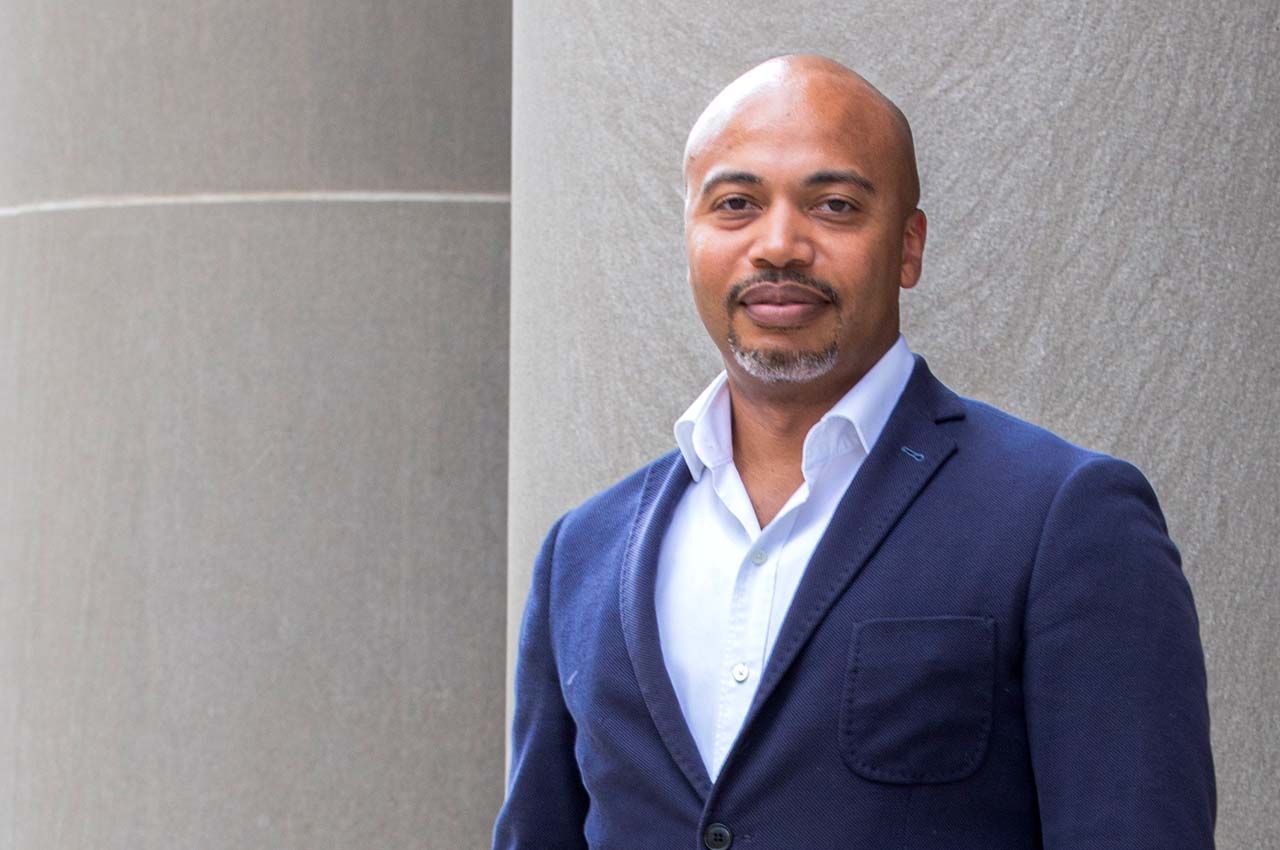The “Generalist” at DEI’s Forefront
As the top city attorney in Evanston, Illinois, Nicholas Cummiongs '08 never thought the ordinance he helped draft would put him at the forefront of the national DEI debate.

Editor's note: this is a story from the the Fall 2022 Chicago-Kent Magazine. To read the magazine in full, follow this link.
To this day, Nicholas Cummings ’08 speaks against what he sees as an anti-generalist prejudice in the legal industry.
“There’s a belief that certain skills are not transferable. But the same rules of evidence apply regardless of the area of law you practice. We all go by the same rules, depending on the level of court you’re in,” Cummings says.
Out of law school, Cummings felt the prejudice of the specialized: recruiters wanted years of practice and education in particular areas before they would glance at a resume.
But after plenty of trial work, addressing numerous areas of law, Cummings soon found himself advising for a highly specialized area: diversity, equity, and inclusion law.
And not just advising. Just last year Cummings was thrust into the national spotlight, responsible for vetting and defending a municipal reparations program that was the first of its kind in the country.
“Every city attorney is not up for this challenge, the potential and likely legal challenge. Nick could have easily said there’s no precedent, it hasn’t happened before,” says former Evanston Alderman Robin Rue Simmons, who worked with Cummings on the program.
“But he didn’t.”
***
Born and raised in Columbus, Ohio, Cummings grew up “a big Law and Order fan.” He was the first in his family to go to college, receiving a bachelor’s degree in computer science from DePaul University—a degree he chose solely to secure a good-paying job when he graduated.
But the economics of that decision offered little in the way of satisfaction.
Just because I was good at it, there was no specific passion,” he says. And soon the economics faltered: the dot-com bubble burst just after Cummings graduated, and he was laid off from his job, just months into his career.
There was a silver lining: now he had an economic argument to go to law school as well. He’d taken a political science course during his undergraduate years.
“It dealt a lot with constitutional law, and I was hooked,” Cummings says.
He received his J.D. certificate in intellectual property law “to try to give me some flexibility.” During school he continued to work full-time in information technology, first for a car dealership and then for an insurance company.
But as soon as he graduated, the United States housing bubble burst.
“Any time I go to school, there’s immediately a recession,” Cummings jokes.
He continued to work in information technology until 2010, when he took a job with the Cook County State’s Attorney’s office as an assistant state’s attorney. Cummings started his career in child support cases, then criminal misdemeanors; he later worked for the real estate and transactions unit of the Civil Actions Bureau where he focused on contracts and real estate closings for the Bureau of Economic Development, working on United States Housing and Urban Development programs.
“It was almost a training ground to start your own practice,” Cummings says. “You have some lawyers that take a lot of pride in being a trial lawyer. But I want to be good at all of those [other] things; I just want to be a good lawyer. I want to be that guy you can trust to do it all.”
Still, Cummings did his share of trial work.
From his time as an assistant state’s attorney, through his time working for the Chicago Transit Authority as a chief attorney in tort litigation, Cummings got his share of trial time, in many cases before juries. He also assisted in federal civil rights cases, picking juries multiple times in federal court.
He eventually applied to corporate firms who, he felt, looked down on his broad range.
But there was one area where being a generalist was a boon. In 2020 Cummings was hired as the deputy city attorney for the City of Evanston, Illinois, where his range of work was seen as an asset.
“I like the government work and specifically what I do, because I’m much more of a generalist than I ever have been in my career,” Cummings says.
But that same year, Cummings was pulled into working on an ordinance that made national headlines as the the first of its kind to delve into a particular realm of equity work: reparations.
***
Former Evanston Alderman Simmons remembers when Cummings was hired as a deputy city attorney.
“His first words to me were his excitement to be able to work on reparations,” Simmons says. “I was equally thrilled to see him, as a Black man, feeling quite confident that he would bring some lived experience to the work of racial justice.”
Cummings arrived just as a subcommittee of three aldermen—those representing the majority-minority wards in the city—started to research a historic issue that they believed still had ramifications today. They’d looked at how Evanston’s land clearance commission had, largely in the 1930s and 1940s, displaced a group of mostly Black residents from their homes, moving them from one part of the city to another, ostensibly to tackle urban blight. Other policies made purchasing property more difficult in that particular area, and fledgling attempts at homeownership and wealth generation by the Black community were halted in their tracks.
“We wanted to move beyond apology and ceremony,” says Simmons, who represented one of the affected wards and still sits on the reparations committee.
How could they address it? And, the aldermen asked Cummings, how could they craft a law that would survive legal challenges?
“People misunderstand the point of reparations,” Cummings says. “Reparations for slavery is a common idea. I will not debate that, I think there should be. But local governments and state governments don’t have the authority to do that.
“[Cities] have to limit [their ordinances] to what local actions have happened. They cannot provide restitution based on private action—the only people with authority to remedy private action is the federal government.”
“We could say with good faith that the city was no longer deliberately indifferent to discrimination going on the city, in the area of housing,” Cummings adds, noting that in 1968 the city passed a fair housing ordinance, making it illegal to discriminate based on race in the area of housing. Though it initially had no teeth in terms of an enforcement mechanism, a year later it did, and was actively levied against banks and realtors operating in Evanston.
But, like most diversity, equity, and inclusion efforts, the aldermen sought to address historic ramifications: the loss of wealth and stability to the city’s Black community in the decades since.
“Always on the forefront of my mind was that the program had to pass constitutional muster,” Cummings says. “Any time you focus your efforts on a suspect class (based on gender, race, or religion), then you have to survive strict scrutiny. It has to have ‘compelling governmental interest,’ and has to be narrowly tailored to address that interest.”
The “compelling interest” part is an “easy hurdle,” Cummings believes, confident in the legal argument that the past actions of the city were harmful, and should be addressed. The trick was narrowly tailoring the ordinance to ensure that it addressed those specific actions.
The ordinance eventually allotted $400,000 from the city’s 2020 cannabis tax for claims of up to $25,000, to go toward a down payment on a home, repairing a current home, or paying down the principal on a current mortgage.
But who had standing to claim they were harmed? In the end, Cummings urged the aldermen to limit the ordinance to Black residents who had lived in the city of Evanston from 1919—the first year that the city started working on a comprehensive plan that prompted the actions of the clearance commision—to 1969, when its fair housing ordinance became effective. It also applied to the residents’ direct descendents.
Within a year, the city awarded claims to 16 people, tapping out the fund. It was officially the first publicly funded municipal reparation program in the country.
Though there have been numerous information requests—from as far away as Utah—relating to the task force’s correspondence; to date there have been no legal claims filed to challenge the ordinance.
“Once people realized it had nothing to do with slavery, it calmed down,” Cummings says.
“Nick is very matter-of-fact. He is all about the business and the outcomes, with a hilarious, dry sense of humor,” Simmons says. “The dry humor is something I appreciate, because the work is so heavy.”
Renewing the fund remains another matter: Cummings is hesitant to directly tap the city’s general fund, out of a concern that might open the ordinance up to legal challenges.
In the meantime, Cummings—now promoted to Evanston’s top city attorney—has used his position to promote equity in the city in other ways. His office is more diverse than most: at one point, the law department of seven included six non-white members and five women.
“When I hire outside counsel, I look into their diversity efforts—how diverse is their firm?” Cummings says. “How diverse is their leadership? Do they have women as partners? LGBTQ partners? Someone who’s not white as a partner?”
He’s also advocating, with the support of the city’s council, manager, and human resources department, for implicit bias training for staff.
Even though he’s not a DEI specialist, Cummings says, his work as a “generalist” hasn’t been bad in that area at all.


